Food Scrap Drop-Off
 Food Scrap Drop-Off
Food Scrap Drop-Off

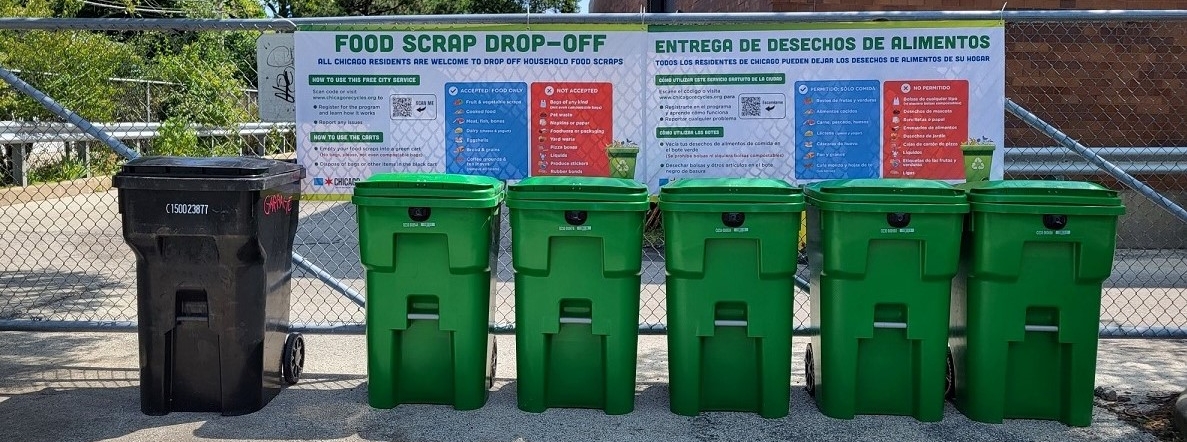




Hey Chicago, let’s compost!
The City of Chicago offers a citywide Food Scrap Drop-Off Program, and all Chicago residents are welcome to drop off their household food scraps for composting at one of 33 locations across the city– for FREE!
Composting keeps food scraps out of landfills, reduces harmful greenhouse gas emissions, and recycles nutrients that enrich soil.
Thank you for helping to meet Chicago’s climate action goals and building healthy soil.
Watch this short video to learn how the program works!
 How To Get Started
How To Get Started

Click on the green icons to see location information, including the address, a site map, and a photo of the cart set-up.
(For a full list of locations, see "Frequently Asked Questions" below.)
Use the Food Scrap Drop-Off Form to sign up for one of the drop-off sites.
Check list of ACCEPTED and NOT ACCEPTED materials.
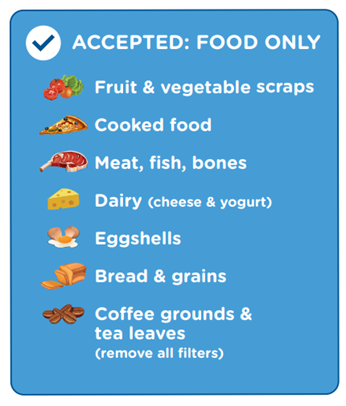
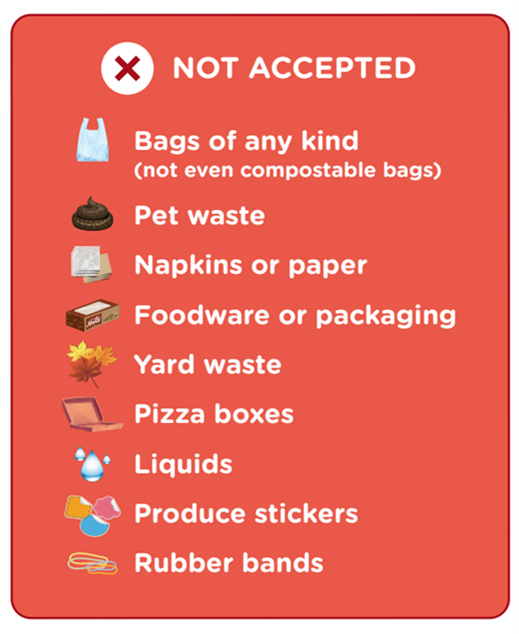
- A reusable food storage container, a kitchen food waste bin/caddy, a reused plastic food container, or even a plastic zip bag can all work well.
- Place your food scraps directly into your container (without a liner bag) and wash the container when you get home. No bags of any kind, not even certified compostable bags or paper bags, are accepted. If you prefer to line your container with a bag, discard the bag after you empty your food scraps at the drop-off site.
- Keep your container in a convenient location, such as your kitchen counter, by your trash can, or in your fridge or freezer. Storing food scraps (especially leftovers, meat, fish, and dairy) in your fridge or freezer will help prevent odors.
- If your kitchen container gets full before you’re ready to visit the drop-off site, empty it into a larger container, such as a 5-gallon bucket with a lid. Store the bucket in a place that outdoor animals can’t access.
- Empty your food scraps into one of the green carts.
- Each cart has a latch located at the front of the lid to prevent wildlife from opening the carts. Squeeze the buttons to release the latch and open the lid, and make sure the latch is securely closed when complete.
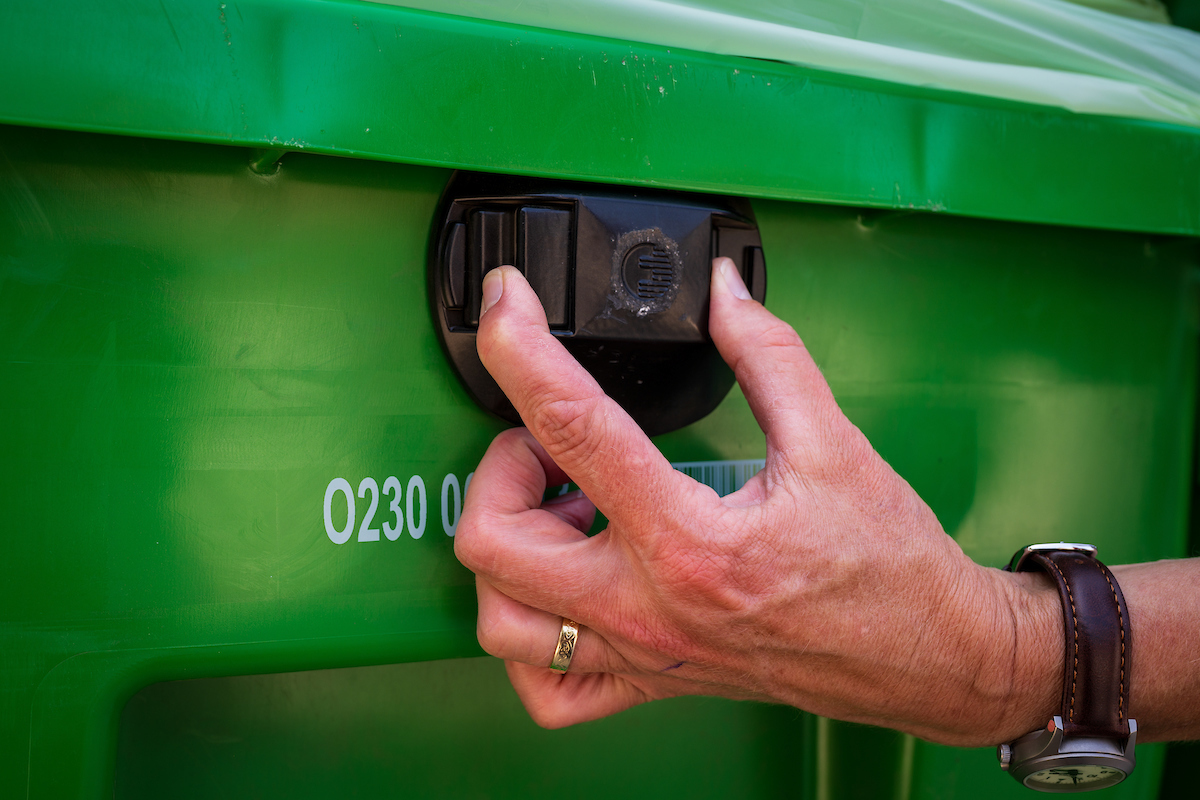
- Dispose of any bags or other items that are not accepted in the black trash cart provided at the site.
- To minimize odors, plan to visit the drop-off site about once a week unless you store your food scraps in your freezer.
To report an issue, ask a question, or provide feedback on the Food Scrap Drop-Off Program, please email dsscomposting@cityofchicago.org or call 312-744-2413.
 What Happens to the Food Scraps
What Happens to the Food Scraps

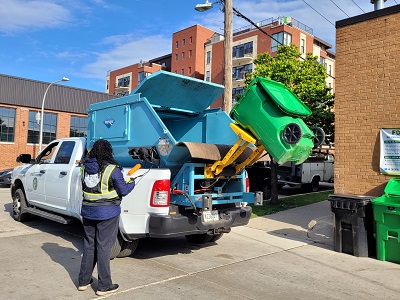
DSS crews collect the food scraps from the drop-off sites.
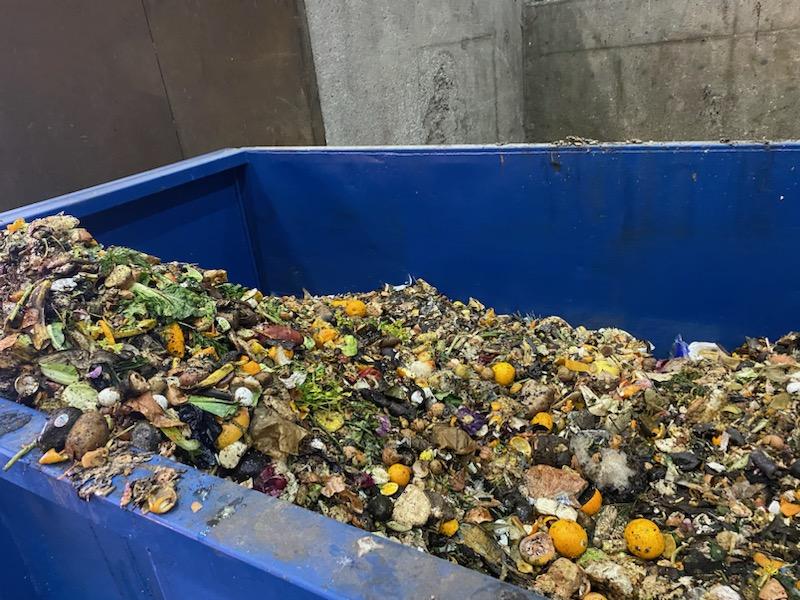
DSS crews unload the food scraps into a large roll-off container at a city-owned transfer facility.
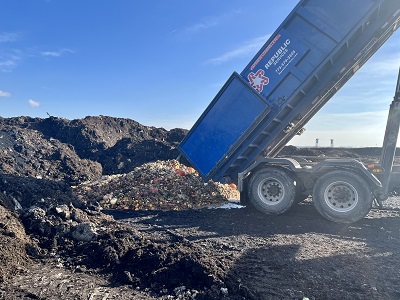
The food waste is transported to the Harbor View Composting Facility, located in Chicago and operated by Whole Earth Compost.
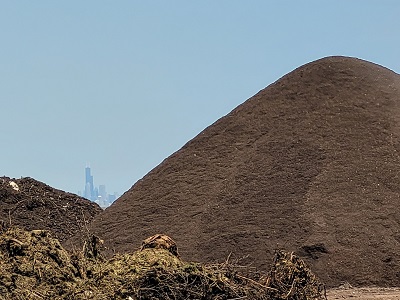
At the composting facility, the food waste is mixed with yard waste, placed in long windrows, and processed into compost over the course of about 3 months.
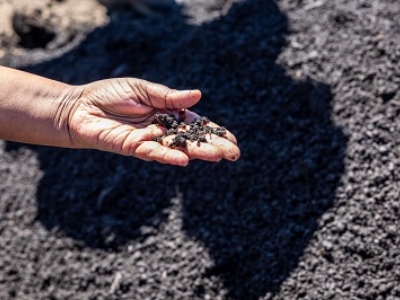
The finished compost is sold as a soil amendment.
 Frequently Asked Questions
Frequently Asked Questions

Composting is a controlled, aerobic (oxygen-using) process that converts organic matter (i.e. food scraps) into compost. Microorganisms, including bacteria and fungi, feed on the carbon and nitrogen in the organic matter to grow and reproduce. Compost, the end product, is a dark, crumbly, earthy-smelling material that can be used to build healthy soil (USEPA).
When food scraps and other organic materials such as yard trimmings decompose in a landfill, it creates methane, a potent greenhouse gas that causes climate change. Keeping wasted food and other organic materials out of landfills significantly reduces methane emissions.
Adding finished compost to soil:
- Returns nutrients and beneficial organisms to soil, reducing the need for pesticides and fertilizers
- Helps retain soil moisture, improves soil structure, and reduces the potential for soil erosion
- Keeps carbon in the soil (USEPA)
The City of Chicago aims for this program to produce high-quality, clean compost that can be used to build healthy soils. To keep the messaging clear and simple and avoid potential sources of contamination, no bags of any kind, not even certified compostable bags, are accepted with the food scraps.
If you would like to use a bag to line your food scrap container at home, please remove the bag when you empty your food scraps into the green cart and dispose of it in the black trash cart at the drop-off site.
Save money by avoiding bags altogether and simply washing your food scrap collection container when you get home from the drop-off site.
The City of Chicago aims for this program to produce a high-quality, clean compost that can be used to nourish and build healthy soils. This program accepts only food scraps to keep the messaging clear and simple and avoid potential sources of contamination.
For pizza boxes, tear off all parts of the box that are not greasy or food-soiled and recycle them in your Blue Cart or other recycling service. Dispose of the greasy or food-soiled parts of the pizza box in the trash.
Animal products or cooked food should not be added to backyard compost bins because they can attract rodents and the microbes in a backyard bin may not generate high enough temperatures to kill pathogens that may be introduced by these foods. Food scraps collected for this program will be composted at a commercial scale composting facility which uses large windrows that reach temperatures high enough to kill pathogens and more quickly break down materials.
Yes, do both! Backyard composting is a great way to keep fruit and vegetable scraps and yard waste (which may make up the majority of your compostable household materials) out of the municipal waste system altogether. Backyard composting has a lower carbon footprint since it doesn’t require transportation, and you can use the finished compost in your garden. So please do continue to use your backyard bin for your plant-based food scraps and yard waste and take the rest of your food scraps (meat, dairy, cooked foods, bread & grains) to the food scrap drop-off location nearest you.
A typical household wastes about $1,500 per year on food that isn’t eaten (USDA). Wasted food also wastes all the water, energy, land, labor, and money that went into producing it. Preventing food waste in the first place helps reduce greenhouse gas emissions and saves you money.
Shop smart, store your food so it lasts longer, and use your leftovers creatively. Learn how at:
Some key statistics:
- In the U.S., 38% of all food goes unsold or uneaten – and most of that goes to waste (ReFED).
- Food waste makes up over 24% of municipal solid waste in the U.S., more than any other material (USEPA, 2019 Wasted Food Report).
Locations listed alphabetically by community area:
- ASHBURN/ Scottsdale Library - 4101 W 79th St
- AUSTIN/ West Chicago Avenue Library - 4856 W Chicago Ave
- AVALON PARK/ Avalon Library - 8148 S Stony Island Ave
- AVONDALE - 3143 N Rockwell St
- BELMONT CRAGIN - 5605 W Grand Ave
- BRIGHTON PARK - 3559 S Maplewood Ave
- DUNNING/ Dunning Library - 7455 W Cornelia Ave
- EAST SIDE/ Vodak-East Side Library - 3710 E 106th St
- EDGEWATER - 5853 N Broadway
- ENGLEWOOD - 611 W 69th St
- FOREST GLEN/ Edgebrook Library - 5331 W Devon Ave
- GARFIELD RIDGE - 5600 S Central Ave
- GRAND BOULEVARD - 4352 S Cottage Grove Ave
- HEGEWISCH/ Hegewisch Library - 3048 E 130th St
- IRVING PARK - 4605 W Lawrence Ave
- LAKE VIEW/ Lincoln Belmont Library - 1659 W Melrose St
- LINCOLN SQUARE - 5333 N Western Ave
- LOGAN SQUARE - 2460 W Cortland St
- LOWER WEST SIDE - 1944 W Cullerton St
- MORGAN PARK - 11059 S Homewood Ave
- NEAR SOUTH SIDE - 1758 S Clark St
- NEW CITY/ Sherman Park Library - 5440 S Racine Ave
- NORTH LAWNDALE - 1817 S Pulaski Rd
- NORWOOD PARK - 6453 W Higgins Ave
- PORTAGE PARK/ Portage-Cragin Library - 5108 W Belmont Ave
- PULLMAN - 1012 E 103rd St
- ROGERS PARK - 6447 N Ravenswood Ave
- SOUTH LAWNDALE/ Toman Library - 2708 S Pulaski Rd
- UPTOWN/ Uptown Library - 929 W Buena Ave
- WASHINGTON HEIGHTS/ Woodson Library - 9525 S Halsted St
- WEST ELSDON - 3720 W 55th St
- WEST ENGLEWOOD - 1756 W 74th St
- WEST TOWN - 2505 W Grand Ave
The Department of Streets and Sanitation hopes to expand the program to more locations in the future. If you would like to suggest a community area for a future drop-off location, please email us at dsscomposting@cityofchicago.org.
All food scraps collected for the program are composted at the Harbor View Composting Facility, located in Chicago and operated by Whole Earth Compost.
Whole Earth sells the finished compost for bulk pick up or delivery. You can learn more about the facility and its processes and products here: www.wecompostllc.com
While the Department of Streets and Sanitation is exploring ways to make the compost more readily available to city residents, we are currently prioritizing providing the Food Scrap Drop-Off Program for free over purchasing the finished product for distribution.
The Department of Streets and Sanitation does not currently offer curbside/alleyside residential food waste collection. Several local companies offer subscription-based food waste collection.
The Illinois Food Scrap & Composting Coalition website provides a list of haulers that offer private food waste hauling for residential and commercial customers.
The Food Scrap Drop-Off Program is for residential household use only. We encourage businesses to contact a private hauler for commercial food waste collection.
The Illinois Food Scrap & Composting Coalition website provides a list of haulers that offer food waste hauling services.
 Resources
Resources

-
Produce Sticker Collage (PDF)
